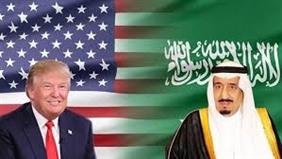ID :
448416
Sat, 05/20/2017 - 10:05
Auther :
Shortlink :
http://m.oananews.org//node/448416
The shortlink copeid
US President Donald Trump Arrives In Riyadh

RIYADH, Saudi Arabia (NINA) - US President Donald Trump arrived in Riyadh on Sunday for his first foreign tour.
It is mentioned that Saudi Arabia will host an Arab-American Islamic summit on Sunday with the participation of more than 50 leaders from various Arab and Muslim countries to confront terrorism and extremism in the presence of US President Donald Trump, who begins his first foreign tour since his inauguration as President of the United States in January.
Officials in Saudi Arabia ended their shuttle flights to Arab and Muslim countries to hand over King Abdullah's invitations to his counterparts, kings, presidents and princes of countries to attend the Arab-American Islamic summit, which will be preceded by a Saudi-American summit that might be extended to a Gulf-America summit. The US president, Donald Trump will meet Saudi Arabia's King Abdullah II after his arrival in Riyadh on Saturday amid unprecedented security measures.
Saudi sources told (NINA) that Saudi Arabia has invited more than 50 heads of Arab and Islamic countries to come to Riyadh and listen to the speech of the American president directed to the Islamic world, especially with the accuracy of the stage in which the Arab world is going through and the various challenges facing the region, especially the fight against terrorism, expecting the summit to come out with results supporting the efforts to achieve security and stability in the Middle East.
Analysts say that this summit is dedicated to Saudi Arabia's leadership of the Islamic world and confirms that the American president's choice was not coincidental, especially after the rapid accession of the Arab and Islamic countries to the Islamic military counter-terrorism alliance announced by Crown Prince Mohammed bin Salman at the end of 2015. As well as the renewal of the Arab and Islamic countries, participating in this summit, their collective commitment to confront the threats of extremism and international terrorism.
For his part, Saudi Foreign Minister Adel al-Jubair told a news conference that leaders of Arab and Islamic countries and the United States recognize the importance of establishing forging strong and lasting partnerships to counter the threat of extremism and that Saudi Arabia is pursuing the same goals in combating terrorism and trying to strengthen its people's immunity against extremism leading to violence.
Arab-Islamic summit in Riyadh will be preceded by three summits. Saudi King Salman will hold a private summit with the US president on Saturday, Saudi media reported.
The Saudi-American summit is expected to focus on deepening bilateral relations and reaching a number of memorandums of understanding to be signed later in Washington, particularly with regard to the armament of Saudi Arabia that is seeking to modernize and develop its defense systems, which is mainly based on the United States.
As for the second summit, President Trump will gather with the leaders of the Gulf Arab states on Sunday. He is expected to discuss the issue of relations and confront the Iranian threats and its behavior, which some Gulf countries are afraid of and ways to deter these threats and stop interfering in the internal affairs of neighboring Arab countries and combating terrorism and extremist groups, according to Saudi newspapers.
At the third summit, the Islamic-American summit is expected to discuss the "hate" issue, and the leaders will hear President Donald Trump, directing a message to Muslims around the world that the United States "does not stand against Islam."
Some Saudi media reported that there is a trilateral summit that includes US President Donald Trump, King Salman bin Abdul Aziz and Egyptian President Abdel Fattah al-Sisi, on the sidelines of the US president's visit to the kingdom, it is not clear whether this meeting will be held before or after the Arab-American Islamic Summit?
This summit brings to mind a speech by US President Barack Obama at the beginning of his reign to the Muslim world from Cairo University in an attempt to repair US relations with the Muslim world after it was badly damaged under former President George W. Bush, who ordered the invasion of Afghanistan and Iraq.
It is also possible, like Obama, Trump would seek to repair his relationship with the Muslim world, which is worried about Tramp's statements and positions during his election campaign, interpreted as anti-Muslim.
US-Saudi relations under President Barack Obama were tense, especially after Washington and the major powers concluded a nuclear deal with Tehran on April 4, 2015.
More than 1,000 journalists, from satellite channels, news agencies and international newspapers from around the world, including the National Iraqi News Agency (NINA) were invited by the Saudi Ministry of Culture and Information to cover this big event. / End





